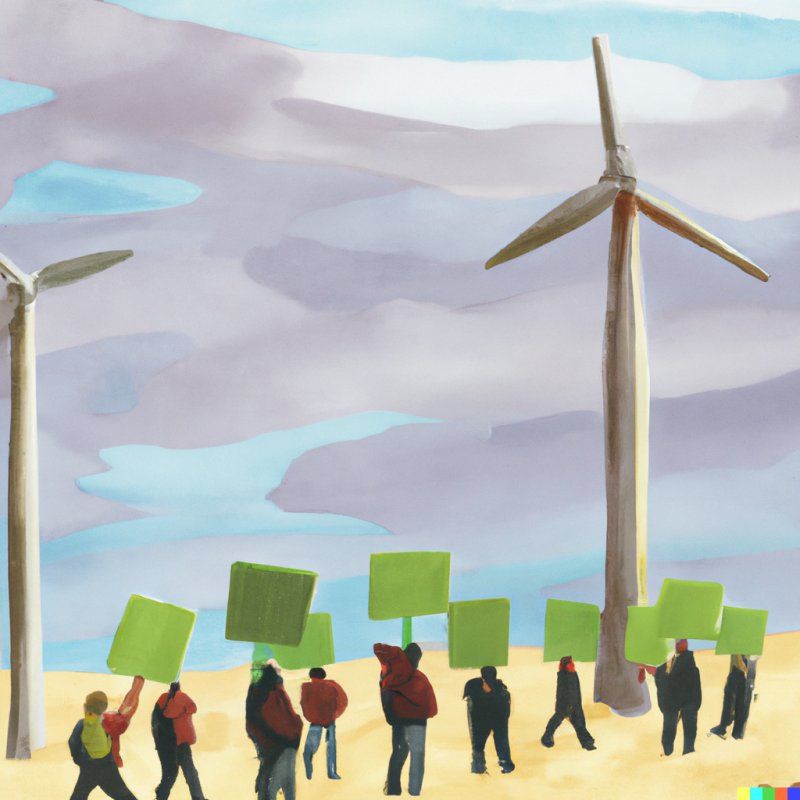Tilting at windmills: How conspiracy theories hinder climate action and what to do about it
How conspiracy theories hinder climate action. Conspiracy theories are an obstacle to effective climate action. Psychological research provides answers on how to overcome them.
Note: This article was already reviewed and is published in the German version of In-Mind.
Conspiracy theories have been on everyone's minds since the COVID-19 pandemic began. We probably all know at least one person who believes in conspiracy theories, and there seems to be a conspiracy theory for almost every topic. Climate change is no exception. Conspiracy theories surrounding climate change question either its existence or human influence on it. Survey data from 21 countries suggest that between 9% and 31% of the population agree with the statement that man-made climate change is a hoax invented to deceive people [1]. In addition to general doubts about climate change, policies to mitigate climate change are also increasingly becoming the target of misinformation and conspiracy theories (e.g., the expansion of renewable energies) [2]. How is the belief in conspiracy theories related to climate-related attitudes and behaviors? And what can be done to overcome them and increase support for climate action?
First, let’s clarify the terminology: conspiracy theories are explanations for societal events that accuse powerful people of secret arrangements with malicious intentions [3]. They usually deviate from generally accepted (official) explanations - at least in most of today's democracies. However, in the global and historical context, there are also examples in which conspiracy theories represent the mainstream or are spread by influential people or even the government itself. Typically, people believe not just one, but several conspiracy theories from different fields. Based on this observation, researchers assume the existence of a so-called conspiracy mentality [4] - the general tendency to believe in (any kind of) conspiracy theories. This tendency is found in individuals all over the world [5], with some individuals having a higher tendency and some having a lower tendency. Both phenomena (the belief in a specific theory and the general tendency) can be summarized under the term conspiracy belief. However, they have different effects on the acceptance of climate action. Therefore, it is important to distinguish between the belief in a specific conspiracy theory related to climate change, belief in specific conspiracy theories unrelated to climate change, and conspiracy mentality as a general tendency to believe in conspiracies (see Table 1).
Table 1
| Definition / What is this? | Example | Relevance for climate protection | |
| Conspiracy mentality | Tendency to believe in conspiracy theories (of any kind) | Not bound to concrete examples | Inrcreased readiness to believe in conspiracy theories (e.g., about wind turbines, climate change) |
| Specific conspiracy theory related to climate change | Conspiracy theory that questions climate change, the human contribution to it, or actions against it | The assumption that there was no (man-made) climate change | Related to lower support for climate action and lower willingness to engage in climate-related behaviors |
| Specific conspiracy theory unrelated to climate change | Conspiracy theory without a direct relation to climate change or climate protection measures | The assumption that the Apollo moon landing did not actually happen | According to current knowledge, no direct relationship with the assessment of climate action or climate-related behaviors |
Conspiracy beliefs as an obstacle to climate action
Studies suggest that belief in climate-related conspiracy theories (e.g., that climate change is a hoax) is associated with attitudes and behaviors that hinder climate action. These include a greater disbelief in (climate) science, lower environmental concern, lower intentions to engage in climate-friendly behavior, and less support for climate mitigation policies (for a meta-analysis, see [6]). However, many of these studies only show correlations. Thus, they do not allow us to conclude that conspiracy beliefs are the cause of the attitudes and behaviors, as it could also be the other way around: that attitudes and behaviors precede the belief in such conspiracy theories. Therefore, some studies have investigated how the exposure to climate-related conspiracy theories affects attitudes and behaviors. These studies show that people who read a text or watched a video that cast doubt on human-caused climate change were subsequently less likely to engage in climate-friendly behavior (e.g., considering energy efficiency when buying appliances [7]) or sign a petition for more climate protection [8] than people who were exposed to content that supported human-caused climate change. One possible explanation for this is that exposure to a climate-related conspiracy theory gave the impression that one has no influence on climate change and that there are uncertainties about the problem of climate change (as well as the scientific consensus on this assessment). Moreover, exposure even had a negative effect on intentions to engage in prosocial behavior in general (e.g., donating to charity) or to engage politically (e.g., voting). These results suggest that climate-related conspiracy theories are a barrier to climate protection in general - not only for people with a high conspiracy mentality - and that they also have an influence on behaviors that are important for social coexistence.
The above findings are specific to climate-related conspiracy theories. The question is whether beliefs in other specific conspiracy theories, that is, those not directly related to climate change or actions against it, show similar correlations. The current evidence is mixed. While some studies show that greater belief in conspiracy theories, such as those about the death of Princess Diana or the Apollo moon landing, is associated with greater rejection of climate science. This seems to be particularly true in the US [9], as the same link has not been found in many other countries [10]. The national context may therefore have a crucial influence on the relationship between the belief in non-climate-related conspiracy theories and the rejection of climate science. For now, it cannot be said that belief in non-climate-related conspiracy theories (e.g., around the Apollo moon landing) necessarily goes hand in hand with the rejection of climate science in countries other than the US.
How is the general tendency to perceive conspiracies in the world around us, that is, conspiracy mentality, related to climate-related attitudes and behaviors? It would make sense to assume that there is link for two reasons. First, a pronounced conspiracy mentality is associated with increased mistrust of (political) elites, experts, and state institutions [4], [11], which are key actors in mitigating climate change. Furthermore, conspiracy beliefs often go hand in hand with lower adherence to social norms [12], but efforts to mitigate climate change often correspond to social norms. Therefore, it is reasonable to assume that those with higher conspiracy mentality will also show resistance to climate change mitigation. Second, the tendency to perceive conspiracies may also lead people to develop specific conspiracy theories [13], for example in relation to specific plans for climate protection measures in their local surrounding. This can be illustrated using the example of wind energy.
When arguments help: The example of wind energy
In Germany, as in many other countries, the accelerated expansion of wind energy is a declared goal of the current federal government. However, concrete projects often fail because of opposition from the local population. In fact, recent studies in Germany revealed a connection between conspiracy mentality and opposition to wind turbines [14]. In these studies, participants were asked to imagine that the construction of five wind turbines was being considered at their place of residence. They were then asked to vote for or against the construction in a mock referendum. Results showed that the participants with higher conspiracy mentality were more likely to reject the construction. This link was much stronger than the influence of characteristics such as age, education, or political orientation. Further, people were even more likely to reject the construction if they believed in a specific conspiracy theory related to the referendum (e.g., that there was collusion between corporations and politicians). In principle, it is possible that such specific conspiracy theories are not the cause but the result of the opposition to wind turbines. For example, it may be that people who are already against wind turbines accept and use conspiracy theories to justify their position. In these studies, both a general conspiracy mentality and belief in a specific conspiracy theory surrounding the referendum were found to be important factors in opposition to wind turbines. But can this opposition be effectively countered?
 Fig 1: The belief in conspiracy theories relates to opposition against wind farms
Fig 1: The belief in conspiracy theories relates to opposition against wind farms
There is a common assumption that people with strong conspiracy beliefs are not open to rational argument. However, recent research suggest that this is not always the case [14] – particularly in the case of conspiracy beliefs about the construction of wind turbines. When people in the referendum described above were presented with positive information about the wind turbines (e.g., about their carbon footprint or opportunities for financial participation), their support for the project increased compared to those who did not receive any further information. This effect was especially strong among those with a strong conspiracy mentality. This positive effect also occurred, albeit to a much lesser extent, among people who believed in the specific conspiracy theory surrounding the referendum. The effect was independent of the source of the information: whether it came from the local government or from the energy company carrying out the project. This means that people who believe in conspiracy theories appear to be open to arguments related to wind energy projects. In reality, however, situations in which only positive information about wind turbines is circulating are rather rare. What happens when arguments from opponents are presented alongside positive information? When this was done in the studies, the information supporting the building of the wind turbines had less impact on the vote. The effect even disappeared completely for those who believed in a specific conspiracy theory surrounding the referendum. Thus, in a public debate where arguments for and against wind turbines are presented, it could be much harder to convince people to support wind turbines. Since belief in specific wind turbines conspiracy theories appears to be a key barrier to the effectiveness of information campaigns, it would be important to prevent such beliefs from arising in the first place. In general, little is known about how conspiracy theories arise in the context of wind turbines, but preventive measures against the spread of conspiracy theories and misinformation can be derived from previous research on other topics.
Preventing the spread of conspiracy theories and misinformation
There are some preventive approaches that have proven effective in the context of misinformation (including on climate change; for an overview, see [15]). So-called " prebunking" strategies focus on making people aware of possible misinformation and preparing them to deal with it before they are actually exposed to it. An important component of this approach is forewarning of possible exposure to misinformation. This can help people to be vigilant and practice dealing with the misinformation in advance. It is also possible to train the recognition of techniques commonly used to spread misinformation (e.g., the use of emotional language), for example in this online game: https://www.getbadnews.com/. This way, people can be prepared to encounter misinformation in different contexts.
 Fig 2: The provision of information can help to reduce the consequences of conspiracy belief
Fig 2: The provision of information can help to reduce the consequences of conspiracy belief
Similar strategies may also be effective in the context of conspiracy theories. For example, making individuals aware that they might encounter a particular conspiracy theory might help to prevent it from influencing people's attitudes. Similarly, in one study, providing detailed information about the COVID-19 vaccine helped to reduce belief in vaccine-related conspiracy theories [16]. It is important to note that this study was conducted at a time when little was known about the new COVID-19 vaccines and conspiracy theories about them were not yet widespread. Thus, providing this information may have helped to clear up uncertainties before conspiracy theories could take hold. Overall, it seems easier to prepare people for exposure to conspiracy theories and misinformation than to deal with them afterwards.
But what to do when friends or family already believe in conspiracy theories? There are few empirical studies that address this question. However, depending on the personal relationship, it may make sense to provide fact-based information in a conversation. Information from people one trusts is generally seen as more credible, so that it is more likely to change one’s opinion. Furthermore, studies suggest that the expectations of friends and family shape behavior, even when that behavior is related to conspiracy theories [17]. For example, people with a strong conspiracy mentality were just as willing to be vaccinated as people with a low conspiracy mentality if they had friends or family who expected them to get vaccinated. This may also be the case with regards to pro-climate behaviors - which should be tested in future studies.
 Fig 3: People can be prepared for the confrontation with conspiracy theories and misinformation so that they believe them less
Fig 3: People can be prepared for the confrontation with conspiracy theories and misinformation so that they believe them less
Overall, belief in conspiracy theories is an obstacle to climate protection, especially when the conspiracy theories are directly related to climate change. Moreover, a general tendency to believe in conspiracies ( conspiracy mentality) can also be reflected in the rejection of climate protection measures and specific climate protection projects (e.g., opposition to a wind energy project). Fortunately, psychological research provides starting points for dealing with this obstacle. Both providing information (especially when provided by those close to us) and preventive measures - such as warnings against possible misinformation – could play a crucial role.
Bibliography
[1] C. Ibbetson, ‘Where do people believe in conspiracy theories?’ Accessed: Apr. 26, 2024. [Online]. Available: https://yougov.co.uk/international/articles/33746-global-where-believe-c...
[2] T. G. Coan, C. Boussalis, J. Cook, and M. O. Nanko, ‘Computer-assisted classification of contrarian claims about climate change’, Sci Rep, vol. 11, p. 22320, 2021, doi: 10.1038/s41598-021-01714-4.
[3] K. M. Douglas, R. M. Sutton, and A. Cichocka, ‘The psychology of conspiracy theories’, Curr Dir Psychol Sci, vol. 26, no. 6, pp. 538–542, 2017, doi: 10.1177/0963721417718261.
[4] R. Imhoff and M. Bruder, ‘Speaking (un-)truth to power: Conspiracy mentality as a generalised political attitude’, Eur J Pers, vol. 28, no. 1, pp. 25–43, 2014, doi: 10.1002/per.1930.
[5] R. Imhoff et al., ‘Conspiracy mentality and political orientation across 26 countries’, Nat Hum Behav, vol. 6, no. 3, pp. 392–403, 2022, doi: 10.1038/s41562-021-01258-7.
[6] M. Biddlestone, F. Azevedo, and S. van der Linden, ‘Climate of conspiracy: A meta-analysis of the consequences of belief in conspiracy theories about climate change’, Curr Opin Psychol, p. 101390, 2022, doi: 10.1016/j.copsyc.2022.101390.
[7] D. Jolley and K. M. Douglas, ‘The social consequences of conspiracism: Exposure to conspiracy theories decreases intentions to engage in politics and to reduce one’s carbon footprint’, British Journal of Psychology, vol. 105, no. 1, pp. 35–56, 2014, doi: 10.1111/bjop.12018.
[8] S. van der Linden, ‘The conspiracy-effect: Exposure to conspiracy theories (about global warming) decreases pro-social behavior and science acceptance’, Pers Individ Dif, vol. 87, pp. 171–173, 2015, doi: 10.1016/j.paid.2015.07.045.
[9] S. Lewandowsky, G. E. Gignac, and K. Oberauer, ‘The role of conspiracist ideation and worldviews in predicting rejection of science’, PLoS One, vol. 8, no. 10, p. e75637, 2013, doi: 10.1371/journal.pone.0075637.
[10] M. J. Hornsey, E. A. Harris, and K. S. Fielding, ‘Relationships among conspiratorial beliefs, conservatism and climate scepticism across nations’, Nat Clim Chang, vol. 8, no. 7, pp. 614–620, 2018, doi: 10.1038/s41558-018-0157-2.
[11] L. Pummerer, R. Böhm, L. Lilleholt, K. Winter, I. Zettler, and K. Sassenberg, ‘Conspiracy theories and their societal effects during the COVID-19 pandemic’, Soc Psychol Personal Sci, vol. 13, no. 1, pp. 49–59, 2022, doi: https://doi.org/10.1177/19485506211000217.
[12] L. Pummerer, ‘Belief in conspiracy theories and non-normative behavior’, Curr Opin Psychol, vol. 47, p. 101394, Oct. 2022, doi: 10.1016/j.copsyc.2022.101394.
[13] R. Imhoff, T. Bertlich, and M. Frenken, ‘Tearing apart the “evil” twins: A general conspiracy mentality is not the same as specific conspiracy beliefs’, Curr Opin Psychol, vol. 46, 2022, doi: https://doi.org/10.1016/j.copsyc.2022.101349.
[14] K. Winter, M. J. Hornsey, L. Pummerer, and K. Sassenberg, ‘Anticipating and defusing the role of conspiracy beliefs in shaping opposition to wind farms’, Nat Energy, vol. 7, no. 12, pp. 1200–1207, 2022, doi: 10.1038/s41560-022-01164-w.
[15] S. Lewandowsky and S. van der Linden, ‘Countering misinformation and fake news through inoculation and prebunking’, Eur Rev Soc Psychol, vol. 32, no. 2, pp. 348–384, 2021, doi: 10.1080/10463283.2021.1876983.
[16] L. Pummerer, K. Winter, and K. Sassenberg, ‘Addressing covid-19 vaccination conspiracy theories and vaccination intentions’, European Journal of Health Communication, vol. 3, no. 2, pp. 1–12, 2022, doi: 10.47368/ejhc.2022.201.
[17] K. Winter, L. Pummerer, M. J. Hornsey, and K. Sassenberg, ‘Pro-vaccination subjective norms moderate the relationship between conspiracy mentality and vaccination intentions’, Br J Health Psychol, vol. 27, no. 2, pp. 390–405, 2022, doi: 10.1111/bjhp.12550.
Pictures
Picture Cover: viarami via pixaby
Picture 1: created by the authors with DALL-E2
Picture 2: created by the authors with DALL-E2
Picture 3: created by the authors with DALL-E2


